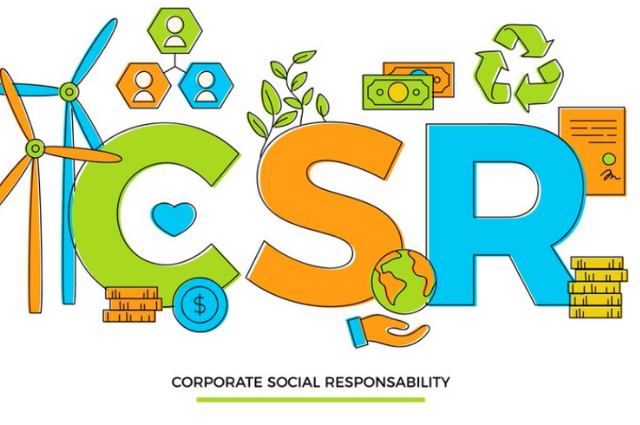What is the CSR Full Form: Have you ever wondered about this buzzing term ‘CSR’? Have you tried to know why CSR is becoming the most talked about topic globally? If ‘Not’ then you must know about ‘CSR’ as it has become the buzzword in the global business world and companies are expected to be not only profitable but also ethical and socially responsible towards contributions. So lets talk about CSR Full Form, Types, Approaches, Work, Scope etc.
What is CSR full form: CSR stands for Corporate Social Responsibility
The full form of CSR is Corporate Social Responsibility. The ideology behind CSR is that every corporation, business or industry is bound to be socially accountable to itself, its stakeholders, and the public. By practising CSR (Corporate Social Responsibility) companies must be conscious about the impact they are making on all aspects of society, including economic, social, and environmental.
Also Read the Latest CSR Interview
CSR full form and its definition from UNIDO, Harvard Bussiness School, Dictionary and Merriam-Webster
Various organisations provide CSR definitions. However, the definition of CSR provided by the United Nations is globally accepted as the benchmark and accepted worldwide. Read below How CSR is defined by UNIDO, Harvard Business School, Dictionary and Merriam-Webster.
UNIDO Definition of CSR: The United Nations Industrial Development Organization define CSR as Corporate Social Responsibility is a management concept whereby companies integrate social and environmental concerns in their business operations and interactions with their stakeholders. CSR is generally understood as being the way through which a company achieves a balance of economic, environmental and social imperatives (“Triple-Bottom-Line - Approach”), while at the same time addressing the expectations of shareholders and stakeholders. In this sense, it is important to draw a distinction between CSR, which can be a strategic business management concept, and charity, sponsorships or philanthropy. For detailed reading: Click Here
How Harvard Business School (HBS) define CSR: The idea that a business has a responsibility to the society that exists around it. Firms that embrace CSR are typically organized in a manner that empowers them to act in a socially responsible way to positively impact the world. It’s a form of self-regulation that can be expressed in initiatives or strategies, depending on an organization’s goals.
CSR Meaning from Dictionary, Collins and Merriam-Webster
Dictionary.com: The idea that a company should be interested in and willing to help society and the environment as well as be concerned about the products and profits it makes.
Collins Dictionary: The incorporation of ethical elements, such as the public interest and environmental concern, into the planning of business strategy
Check for the Latest CSR News
Evolution of CSR as a Terminology: CSR has been in practice for centuries where organisations give back to society in several ways like donations of food, clothes, education, shelters, skill development, etc. However the origins of CSR a not coined until 1953, when American economist ‘Howard Bowen’ published the book named ‘Social Responsibilities of the Businessman’. In this book, Bowen identified the great power of corporations and recognized that their actions had a tangible impact on society. Howard R. Bowen was president of Grinnell College from 1955 to 1964. The Social Responsibilities of the Businessman published in 1953 is considered the foundation for the study of corporate social responsibility (CSR). Read more on who is Howard R. Bowen.
Later on in 1991, Professor Donna J. Wood of the University of Pittsburgh expanded and improved CSR models by highlighting the moral purpose of business and its proper relationship to society. She also provided a framework for assessing the outcomes and impacts of CSR programs.
For More Reading: CSR in India: CSR Definition and CSR Eligibility in Companies Act 2013
What are the different types of CSR: Environmental, Ethical, Economical, And Philanthropic
In boarder terms, CSR can be categorised into four different types. However, the different types of CSR can be further divided into various subcategories which can be further broken down into different aspects. The four border aspects of CSR responsibility are environmental, ethical, economical, and philanthropic.
|
Environmental CSR
|
- Focuses on reducing an organization's carbon footprint and environmental impact.
- Involves sustainable resource management, waste reduction, and energy efficiency.
- Encourages conservation efforts and the use of renewable energy sources.
|
|
Ethical CSR
|
- Concentrates on fair business practices and adherence to ethical standards.
- Prioritizes human rights, labour conditions, and transparency in supply chain management.
- Aims to foster a responsible business culture that respects all stakeholders.
|
|
Economic CSR
|
- Emphasizes an organization's contribution to economic development.
- Involves job creation, fair wages, and supporting local economies.
- Focuses on financial responsibility and contribution to the economic health of communities.
|
|
Philanthropic CSR
|
- Involves charitable giving, volunteerism, and supporting social causes.
- Encourages participation in community development projects.
- Aims to make a positive impact on society and improve community well-being
|
.png.png)
What are CSR Demands vs. Benefits:
The demand for CSR varies according to the types and interventions. The CSR demands include financial investment, resource allocation, and time commitment. Sometimes CSR demands require organizational change, employee training, and stakeholder management to come up with effective strategies, solutions and innovations. However, the benefits are substantial. The CSR benefit enhances organisations' reputation and brand value leading to customer loyalty and market differentiation. Employee engagement and retention improve, reducing turnover costs. CSR drives innovation for operational efficiency to encourage sustainability and mitigates risk management by proactively addressing social and environmental issues. The CSR provides positive relationships among stakeholders, leading to support during challenges and collaborative opportunities for ensuring long-term business success and sustainability.
What is India CSR:
In India, CSR is mandatory according to the law. CSR in India is governed by Section 135 of the Companies Act, 2013 along with the Companies (Corporate Social Responsibility Policy) Rules, 2014. In India, CSR activities come under the preview of the Ministry of Corporate Affairs, Government of India.
CSR activities are mandatory for companies that have a net profit of more than INR 5 crore on an annual basis. These companies are required to spend amounting to 2% of their average annual profit over the last three years. The CSR eligibility for the companies in India is mentioned below.
|
The net worth
|
INR 500 crore or more
|
|
Turnover
|
INR 1000 crore or more
|
|
Net profit
|
INR 5 crore or more
|
CSR Full Form FAQs (Frequently Asked Questions)
Question 1: What is the Full form of CSR?
Answer: The full form of CSR is Corporate Social Responsibility (CSR).
Question 2: What is CSR in work?
Answer: Corporate Social Responsibility is a management concept by which companies integrate social and environmental concerns into their business operations and interactions with their stakeholders.
Question 3: What are the 4 types of CSR?
Answer: The four border aspects of CSR responsibility are environmental, ethical, economical, and philanthropy
Question 4: What is CSR fund?
Answer: CSR activities are mandatory for companies that have a net profit of more than INR 5 crore on an annual basis. These companies are required to spend amounting to 2% of their average annual profit over the last three years
Question 5: What is the full form of CSR in retail?
Answer: Corporate Social Responsibility (CSR) has emerged as a crucial aspect for retail businesses to distinguish themselves. The advantages of CSR are evident – it not only enables companies to make a significant impact but also provides more opportunities to connect with customers and align the business with consumer values.





.png.png)




.jpg)



